|
|
|
Sort Order |
|
|
|
Items / Page
|
|
|
|
|
|
|
| Srl | Item |
| 1 |
ID:
155070
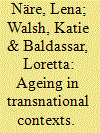

|
|
|
|
|
| Summary/Abstract |
This Special Issue on ‘Ageing in Transnational Contexts: Transforming Everyday Practices and Identities in Later Life’ extends our understanding of how ageing is experienced in transnational contexts. It focuses on how everyday lives and identities in older age are being negotiated by individuals who have migration histories or who are affected by the mobilities of others in their lives. In the introduction, we situate our approach within an emerging strand of research investigating the inter-related processes of ageing and transnational migration. We also present the seven empirical case studies that constitute the issue and discuss their collective contribution for the research field.
|
|
|
|
|
|
|
|
|
|
|
|
|
|
|
|
| 2 |
ID:
144356
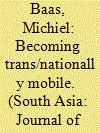

|
|
|
|
|
| Summary/Abstract |
The growth of Indian students' enrolment numbers in Australian educational institutions has often been linked to the relatively easy pathway the country, until recently, offered towards Australian permanent residency (PR). However, building on ethnographic data collected over the past ten years this article shows that ‘permanently’ residing in Australia is often not the objective. Instead, the mobility that these Indian student-migrants aim for encompasses a broader understanding of mobility that includes a variety of locations in both countries and beyond which emerge and/or are abandoned organically in an individual's trajectory. As such it is argue that their mobility strategies can be conceptualized as having ‘trans/national’ dimensions.
|
|
|
|
|
|
|
|
|
|
|
|
|
|
|
|
| 3 |
ID:
111512
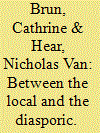

|
|
|
|
|
| Publication |
2012.
|
| Summary/Abstract |
In May 2009, Sri Lankan government armed forces defeated the Liberation Tigers of Tamil Eelam (LTTE) after more than a quarter of a century of civil war. With the elimination of most of the LTTE leadership and the waning of its hold over Tamils in Sri Lanka and abroad, the scene was set for a transformation of relations between the diaspora and those at home. It is the dynamics of this transformation that we explore in this article, which traces the shifting centre of gravity in Tamil politics between actors in the homeland and those in the diaspora. Drawing on Bourdieu's notion of a 'political field', we characterise what we call the local, diasporic and transnational political fields in the Sri Lankan setting. This article shows how the LTTE's power derived largely from its control of the transnational political field, including in places that were otherwise isolated from diasporic connections. The defeat in 2009 fundamentally changed the dynamics of transnational politics by greatly weakening the LTTE's grip over the transnational political field, and this article explores the new dispensation that is now unfolding.
|
|
|
|
|
|
|
|
|
|
|
|
|
|
|
|
| 4 |
ID:
125915
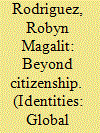

|
|
|
|
|
| Publication |
2013.
|
| Summary/Abstract |
This article traces the formation of the International Migrants Alliance (IMA) through a study of its leading organisations and central campaigns. Founded in 2008 by 108 self-described 'grass-roots' migrant organisations, the IMA is a transnational coalition of groups from nearly every continent of the world. I suggest that through their work in IMA, migrants express a new form of political subjectivity, a form of 'migrant labour transnationalism.' Migrant labour transnationalism, unlike the homeland-oriented, citizenship-based, state-supportive forms of migrant political transnationalism generally identified in the scholarship, is based on counter-hegemonic nationalisms through which migrants contest their home states' complicity with the project of neoliberal globalisation. Migrant labour transnationalism is, moreover, formed through contentious forms of political engagement and new transnational networks through which migrants are cultivating class-based collective identifications.
|
|
|
|
|
|
|
|
|
|
|
|
|
|
|
|
| 5 |
ID:
073442
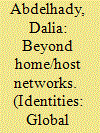

|
|
|
|
|
| Publication |
2006.
|
| Summary/Abstract |
This article draws on postcolonial understandings in order to offer a sociological analysis of Lebanese immigrants in Montreal, New York City and Paris. I argue that the concept of diaspora provides a framework for understanding the contradictory aspects of Lebanese immigrant experiences, as some immigrants may undergo a process of assimilation while others continue to hold on to their ethnic identities. Investigating Lebanese immigrant communities as a diaspora leads to the understanding of the ways immigrants construct solidarities that include their homeland, host societies, and the larger diaspora community in various parts of the world. As an analytical framework, "diaspora" incorporates multiple loyalties and attachments that are integral to processes of international migration. Thus, the framework of diaspora promises significant contributions to the understanding of the complex dynamics involved in migration and globalization.
|
|
|
|
|
|
|
|
|
|
|
|
|
|
|
|
| 6 |
ID:
169414
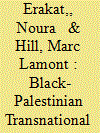

|
|
|
|
|
| Summary/Abstract |
This introductory essay outlines the context for this special issue of the Journal of Palestine Studies on Black-Palestinian transnational solidarity (BPTS). Through the analytic of “renewal,” the authors point to the recent increase in individual and collective energies directed toward developing effective, reciprocal, and transformative political relationships within various African-descendant and Palestinian communities around the world. Drawing from the extant BPTS literature, this essay examines the prominent intellectual currents in the field and points to new methodologies and analytics that are required to move the field forward. With this essay, the authors aim not only to contextualize the field and to frame this special issue, but also to chart new directions for future intellectual and political work.
|
|
|
|
|
|
|
|
|
|
|
|
|
|
|
|
| 7 |
ID:
092653


|
|
|
| 8 |
ID:
164985
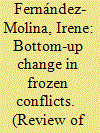

|
|
|
|
|
| Summary/Abstract |
This article proposes a typology of causal mechanisms whereby transnational relations of recognition constitute conflict actors in frozen conflicts. While the agency of an emerging conflict actor manifests itself in ‘struggles for recognition’ motivated by experiences of ‘disrespect’, responses from different significant others vary in terms of motivations and pathways (mechanisms of recognition). Adapting Honneth’s tripartite division, the typology distinguishes between four forms of recognition: thin cognitive recognition, ‘respect’/rights, ‘esteem’/difference, and ‘love’/empathy. Three transnational corrections are made in order to include transnational relations of recognition, non-state actors, and unstructured social-relational forms of international/transnational recognition. The typology is applied to the conflict of Western Sahara, which has been reshaped by the rise of internal Sahrawi pro-independence groups (based inside the territory annexed by Morocco) as an increasingly relevant conflict actor, with their identity shifting from victims to human rights activists to activists involved in an unsolved conflict. This identity and social-status formation has been the product of transnational recognition from three significant others: the annexing state (Morocco), the contested state-in-exile (SADR), and the international community. The overall effect of intermingling recognition processes, including various instrumental initiatives deprived of mutuality, has been increased struggle and conflict complexity rather than ‘recognitional peace’.
|
|
|
|
|
|
|
|
|
|
|
|
|
|
|
|
| 9 |
ID:
165964


|
|
|
|
|
| Summary/Abstract |
In the last two decades, mobile phones and new technologies have transformed migration. Some scholars argue that they help empower migrants, who are otherwise often marginalized in their host country. We discuss the extent to which this is true for Kyrgyz labour migrants in Russia, a relatively large diaspora that suffers from multiple levels of disempowerment, ranging from precarious living and working conditions to a lack of legal support and representation from their home government. Relying on fieldwork conducted in Kyrgyzstan in 2017 and 2018, we explore the extent to which smartphones are enabling Kyrgyz labour migrants in Russia to be informed about migration rules, help each other abroad, connect as a diaspora, and discuss important diaspora topics. Our findings are relevant beyond academia, as many international and governmental agencies are trying to assist migrants through technology; they also point to several missed opportunities for these organizations.
|
|
|
|
|
|
|
|
|
|
|
|
|
|
|
|
| 10 |
ID:
085860
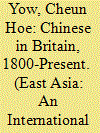

|
|
|
|
|
| Publication |
2008.
|
| Summary/Abstract |
What readers will not find in the book The Chinese in Britain. 1800-Present:Economy, Transnationalism, Identity is obsession with taking up any particular theoretical lens to scrutinize and magnify issues pertaining to the Chinese diaspora.
|
|
|
|
|
|
|
|
|
|
|
|
|
|
|
|
| 11 |
ID:
110589
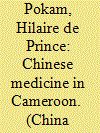

|
|
|
|
|
| Publication |
2011.
|
| Summary/Abstract |
China's arrival on the African economic scene is overturning the balance of forces in place since the independence of African countries. Africa is regarded by some as a "new hunting ground" or "promised land" for China, making it part of its global strategy. This article sets out to examine one of China's so-called "soft power" strategies, represented by the widespread practice of Traditional Chinese Medicine overseas. It focuses on Cameroon, which is a mainstay for Central Africa on account of its harbour and its regional economic dominance.
|
|
|
|
|
|
|
|
|
|
|
|
|
|
|
|
| 12 |
ID:
083726
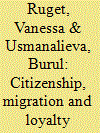

|
|
|
|
|
| Publication |
2008.
|
| Summary/Abstract |
Building upon recent studies in the field of citizenship and transnationalism, this article examines the relations that Kyrgyzstani migrants in Kazakhstan and Russia entertain with their homeland, both in terms of concrete status (rights and responsibilities) and subjective attitudes (feeling of membership and loyalty). The article relies on field research, including semi-structured interviews, conducted in March and April 2007. Findings show that Kyrgyzstani migrants have developed a distinctive and somewhat paradoxical relation to their state of origin, in which pragmatic interest and long-term loyalty are not easily reconciled
|
|
|
|
|
|
|
|
|
|
|
|
|
|
|
|
| 13 |
ID:
154635
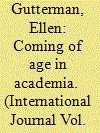

|
|
|
|
|
| Summary/Abstract |
Taking the view of International Relations (IR) as a socio-intellectual space conditioned by historical circumstances, and drawing on my personal reflections on international politics in the 1990s as a particularly important influence on my own professional and intellectual path in IR, this paper explores the 1990s as an exceptional period that shaped the decline of Canadian Foreign Policy as a field of study in Canadian IR. Bookended by the collapse of the Soviet Union and the end of the Cold War, at the beginning, and the start of the War on Terror at its finale, the 1990s can be read as an “optimistic interregnum” during which new possibilities arose for an inclusive, global transnationalism and the global governance of important problems. New ideas and new ways of conceptualizing IR through a global lens emerged. For Canadian students of IR in the 1990s, outward-looking globalism, transnationalism, cosmopolitanism, and theoretical eclecticism fit with the hopeful optimism of the times. In contrast, CFP—with its attendant requisite of policy relevance in service of Canadian national priorities—seemed inward-looking, parochial, and on the sidelines of important new intellectual currents and analyses.
|
|
|
|
|
|
|
|
|
|
|
|
|
|
|
|
| 14 |
ID:
090904
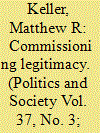

|
|
|
|
|
| Publication |
2009.
|
| Summary/Abstract |
Based on an analysis of the reports of twenty-eight national-level public commission inquiries into events involving ethno-national violence-drawn from five national contexts and arrayed over the course of the twentieth century-this article demonstrates the strikingly transnational character of these investigatory bodies' attempts to authoritatively explain episodes of collective violence and to thereby restore governing legitimacy in the wake of violent crises. One of four distinct "logics," or core explanatory frameworks, each associated with a particular mode of "racial power," characterized a diverse cross-national pool of violence commission reports during defined periods of the twentieth century. In revealing globally encompassing logics to what has often been framed as a national or case-specific phenomenon, the author shows how global ideational currents compose a key dimension of national political dynamics.
|
|
|
|
|
|
|
|
|
|
|
|
|
|
|
|
| 15 |
ID:
180653
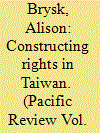

|
|
|
|
|
| Summary/Abstract |
In an era of worldwide rights regression, beleaguered Taiwan remains Asia’s most democratic, gender equitable, and liberal internationalist nation. What accounts for this seemingly exceptional record—and how does the feminist factor contribute to the construction of rights? Bridging constructivist and feminist scholarship, this essay argues that gender equity is a force multiplier for democratization as it empowers civil society and fosters legitimacy at home and abroad. In a three-level game, states at the margin of the international system may benefit from rights reform that expands the national interest and delivers material and reputational rewards. The case of Taiwan illustrates the dynamics of the double transition to liberal democracy and a liberal gender regime and its projection to world politics. The rewards of rights for Taiwan suggest a wider range of options even in small states facing regional challenges—and greater attention to the feminist factor in world politics.
|
|
|
|
|
|
|
|
|
|
|
|
|
|
|
|
| 16 |
ID:
089759
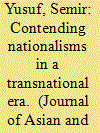

|
|
|
|
|
| Publication |
2009.
|
| Summary/Abstract |
Embarking on an outlook pertinent to the state of social fields in a global era, this article demonstrates the validity of the insight that rejects any strict bifurcation between localizing and globalizing tendencies in the maintenance of social life-worlds. By employing an appropriate term for the `transgressive' nature of nationalistic imaginations and actions, `transnationalism', it delves into qualitatively, but briefly analyzing the current status and futurity of, and the nature of the relationship that exists between, Ethiopianist and Oromo (a specific brand) nationalisms. The result is that neither of the two nationalisms seems to vanish amid the `network society' of the new global era, nor, by implication, is the contention between them likely to recede (until and unless they undergo significant, internal qualitative transformations).
|
|
|
|
|
|
|
|
|
|
|
|
|
|
|
|
| 17 |
ID:
183031


|
|
|
|
|
| Summary/Abstract |
Many European countries have been the target of jihadist terrorist attacks between 2015 and 2017. While the chance of becoming a victim of a terrorist attack is low, terrorism scholars have emphasized that terrorism does not revolve around statistics and casualty numbers. Terrorists use attacks to reach an audience and affect groups beyond the direct victims. To this date, little is known about how terrorist attacks might affect the salience of terrorism beyond national borders. This paper investigates possible convergence of issue salience of terrorism among citizens within the European Union for ten jihadist attacks in the period 2015–2017 using Eurobarometer survey data. The results indicate that it is not simply a question of convergence or divergence of salience of terrorism after a terrorist attack. The connection is multidirectional and depending upon a variety of factors. Most importantly, we observed convergence on the EU-level, but divergence on the national level. This raises important questions about the transnationality of the effects of terrorism. As this research does not test nor find a causal mechanism and is solely dependent on existing data, further research is necessary to test some of its findings.
|
|
|
|
|
|
|
|
|
|
|
|
|
|
|
|
| 18 |
ID:
083743
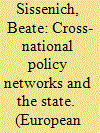

|
|
|
|
|
| Publication |
2008.
|
| Summary/Abstract |
This article challenges optimistic claims about the power of nonstate actors in cross-border policy networks. In a pilot study of two most-likely cases, the article examines the social policy network between the European Union and Poland and Hungary prior to accession. Two dimensions guide the analysis: Whether states act as gatekeepers and whether national borders restrict communications. The article shows that while labor and employers easily communicate with the EU, contacts fail to cut across national borders. Network data show that the EU significantly controls the flow of communication, a fact that runs counter to the notion of networks as fluid entities that enable all actors to link freely with others. Governments and the EU have an interest in network construction and control. Only by tracking network contacts empirically, the article argues, are we able to estimate the capacities and limits of nonstate actors in transnational politics.
|
|
|
|
|
|
|
|
|
|
|
|
|
|
|
|
| 19 |
ID:
052467
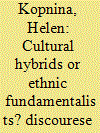

|
|
|
|
|
| Publication |
June 2004.
|
| Summary/Abstract |
This paper examines national and ethnic discourses within Singaporean small and medium enterprises (SMEs) and the ambiguities and dichotomies characterising Singaporean national and ethnic identity. Singapore is represented officially as a multi-ethnic state with a Chinese majority which claims to integrate minority groups such as Indians and Malays successfully, and it boasts a generalised Singaporean culture and identity that supposedly embrace the racial and ethnic diversity of the population. However, Singapore also hosts tensions and conflicts associated with such diversity. This paper examines workplace discourses which address tensions and congruencies. The paper is based on research conducted between April 2002 and May 2003, involving 50 SMEs representing various sectors of the economy and constituting various ethnicities. The research found that, while discourses on ethnicity and nationality may be characterised as somewhat 'shifting' and 'fluid', the respondents present their identities as rather fixed. Primordial ties rather than postmodern multiplicity may better characterise discourses among the workers and owners of Singaporean SMEs.
|
|
|
|
|
|
|
|
|
|
|
|
|
|
|
|
| 20 |
ID:
120787
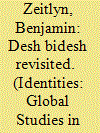

|
|
|
|
|
| Publication |
2013.
|
| Summary/Abstract |
This article discusses the emergence of a 'British Bangladeshi social field'. It makes two connected arguments about its effects. First, it argues that the emergence of the British Bangladeshi social field has rendered the discourses of desh and bidesh less important. Second, it argues that British Bangladeshis are embedded into many transnational social fields and lead multiply orientated rather than binary lives. It uses the example of the importance of the global Islamic umma (community) to British Bangladeshis to illustrate this and argues that it has also contributed to the decreasing importance of the discourse of the desh. What this shows is that the transnationalism of today is very different from that of 20 years ago, both in terms of how it is experienced and how it is analysed.
|
|
|
|
|
|
|
|
|
|
|
|
|
|
|
|
|
|
|
|
|